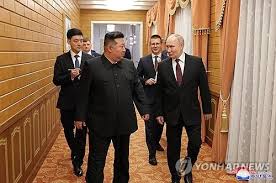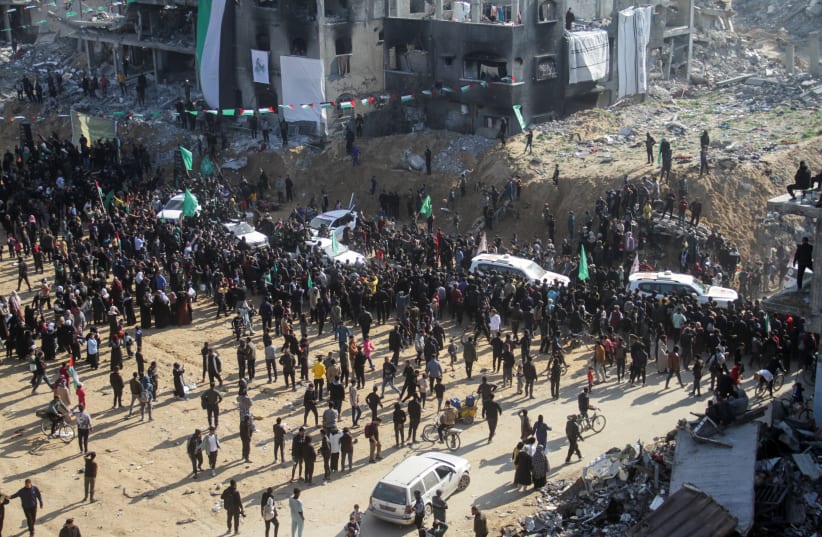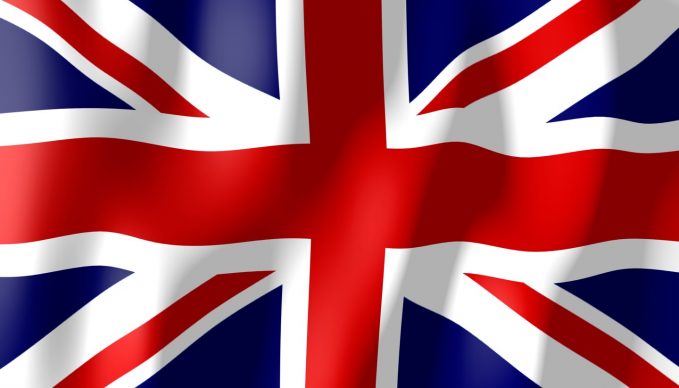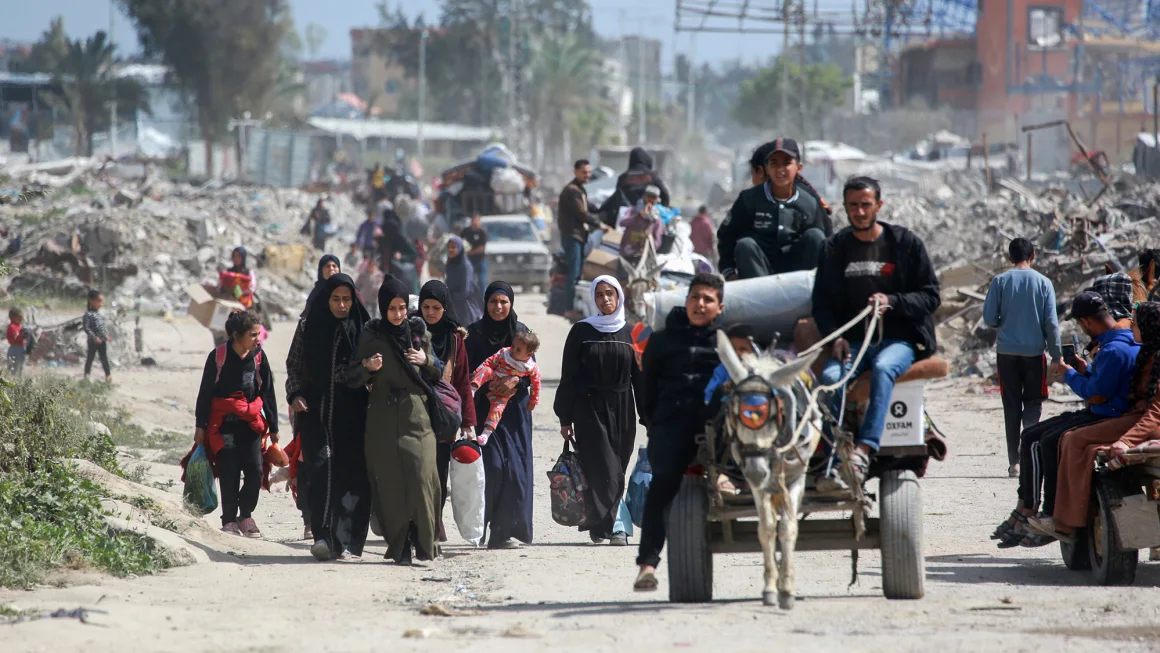Foreign
North Korea’s Kim declares ‘full support’ for Russian war in Ukraine – Russian President Vladimir

In a show of defiance against Western sanctions, Russian President Vladimir Putin and North Korea’s Kim Jong Un signed a comprehensive strategic pact on Wednesday pledging to come to each other’s assistance in case of a military attack — the starkest evidence yet of Russia’s alignment with anti-Western nations determined to topple the United States as a global leader.

Putin, visiting the North Korean capital, Pyongyang, for the first time since 2000, said Russia and North Korea “pursue an independent foreign policy and do not accept the language of blackmail and diktat.”

“The comprehensive partnership agreement signed today provides, among other things, for mutual assistance in the event of aggression against one of the parties to this agreement,” Putin said.
Shunned by the West over his invasion of Ukraine, Putin is seeking partners who share his anti-Western stance, including China, Iran and North Korea. Kim extolled the “firm alliance” with Moscow and openly backed Putin’s war against Ukraine, the strongest support for Russia’s invasion from any foreign leader.
“Moscow and Pyongyang will continue to oppose the practice of sanctions strangulation that the West has become accustomed to,” Putin said, calling for a review of U.N. sanctions against North Korea over its nuclear weapons program.
His remarks — supporting North Korea’s right to “take justified measures” to ensure its national security — will inevitably increase Western fears of new Russian military and technological support for North Korea.
Putin also blamed the “confrontational policy” of the United States for undermining peace and stability on the Korean Peninsula.
“We categorically reject the attempts to blame [North Korea] for the worsening situation,” Putin said, adding that Pyongyang was “entitled to take justified measures to strengthen its national defense capacities, ensure national security, and protect its sovereignty.”
Russia for years backed U.N. sanctions against North Korea but in March vetoed a Security Council vote on extending a U.N. panel of experts monitoring sanctions compliance. Since then, senior Russian officials have repeatedly used the term “strangulation” to describe the U.N. sanctions.
Putin first visited North Korea in 2000, shortly after his election as president, becoming the only Russian or Soviet leader to travel to Pyongyang. He wanted to restore his country’s influence over the Korean Peninsula. For the next 24 years, he saw no need to return — until Wednesday.
The reason: To sustain his war on Ukraine, he needs North Korea’s help.
After an ostentatious welcome ceremony and an afternoon of meetings, the two emerged to announce their shared vision of a united front against the West and the U.S.-led global order. Putin asserted his country’s fight against “decades of imperialist policies” of the United States and its allies. In turn, North Korea promised “full support and solidarity for the Russian government, army and people” in the war in Ukraine, state media agencies reported.
The two leaders signed an agreement on “comprehensive strategic partnership,” Russian media reported. The text was not immediately published, but Russian officials said before the meeting that it would replace previous key documents.
Russian President Vladimir Putin and North Korean leader Kim Jong Un signed an aid agreement in Pyongyang on June 19. (Video: The Washington Post)
Whatever the ultimate extent of the agreement, it served as a clear rejoinder to President Biden and Ukrainian President Volodymyr Zelensky just six days after they signed a 10-year security agreement committing the United States to provide Kyiv with a wide range of military aid.
Putin’s visit underscored the dramatic changes in the countries’ relationship in the aftermath of the Russian invasion of Ukraine in 2022. For decades after the founding of North Korea in 1945, the Soviet Union served as its main economic and security benefactor. Now, as Putin faces growing isolation and a dwindling supply of artillery to use in Ukraine, North Korea has become one of its few remaining sources of diplomatic and military support.
In a front-page article in the newspaper of North Korea’s ruling party, Putin proposed cooperation between Moscow and Pyongyang in fighting sanctions, in creating a new security architecture across Eurasia, and in science and tourism. He wrote that Russia would a form a new trade and financial network to compete with Western-controlled global financial institutions.
“Russia is fighting the hegemonic and imperialist policy of the United States and its satellites against the Russian Federation which has been imposed for decades,” Putin wrote. “We highly appreciate your consistent and unwavering support for Russian policy, including in the Ukrainian direction.”
North Korea, for its part, has plenty to gain from Russia. Kim is facing increasing economic sanctions and isolation because of his nuclear ambitions. He needs food, fuel, cash and weapons technology — all of which Russia can provide.
Russian President Vladimir Putin and North Korean leader Kim Jong Un attend a welcome ceremony at Kim Il Sung Square in Pyongyang on Wednesday. (Vladimir Smirnov/Sputnik/Pool/Reuters)
Still, it is unusual for North Korea to have such a valuable bargaining chip with Russia, given its tiny size, poor economy and international pariah status. Kim is no stranger to bluster, but usually with no real upper hand in a diplomatic negotiation.
“I think the fact that Putin has to come all the way to North Korea to pay his respects underscores how desperate he is for the ammunition he needs from North Korea,” said Michael McFaul, former U.S. ambassador to Russia. “That is a giant reversal from 10 to 20 years ago when Putin was the powerful one. Now he needs weapons, and he needs Kim Jong Un, and he needs weapons for his war in Ukraine.”
It’s unclear whether this is merely a temporary relationship of convenience or a lasting military alliance similar to the Cold War era, analysts say. Either way, it highlights a remarkable evolution in their growing cooperation since the invasion, experts note.
“This summit serves as both a testament to the current strength of the relationship between the two countries and a harbinger of an even stronger partnership in the future,” said Lami Kim, professor at the Daniel K. Inouye Asia-Pacific Center for Security Studies in Honolulu.
Pyongyang was lined with Russian flags and banners with Putin’s photo, welcoming the first major world leader to visit the country since North Korea’s pandemic closures, Russian media footage showed.
Kim did not elaborate on what his “full” support for Russia might look like, but the remarks, reported by Russian media in Pyongyang, will fuel concerns that the outcast leaders of two heavily sanctioned states will use this visit to deepen their military partnership.
Washington and its allies contend that North Korea, which is believed to have a large stockpile of dated artillery shells and rockets compatible with Soviet and Russian weapons systems, has been sending Russia munitions to use against Ukraine.
North Korea has sent at least 10,000 shipping containers to Russia, which could hold as many as 4.8 million of the types of artillery shells that Putin has used in Ukraine, South Korea’s defense minister, Shin Won-sik, told Bloomberg last week.
The State Department said Tuesday that North Korea had unlawfully transferred “dozens of ballistic missiles and over 11,000 containers of munitions to aid Russia’s war effort” in recent months.
Fyodor Tertitskiy, an expert on North Korea’s history and military at Seoul’s Kookmin University, said the visit was purely pragmatic. “They are not both cooperating because they like each other, but because they hope to get something,” he said. “It’s not like an ideological alliance, it’s tactical cooperation.”
On the economic side, Russia may need North Korean labor, said Andrei Lankov, a Russia-born North Korea expert. North Korean workers remain in Russia, in violation of U.N. bans on North Korean labor exports.
“The Russian economy is now going through a minor economic boom … and the shortage of labor is significant. So I expect a large number of North Korean workers to arrive in Russia soon,” Lankov said.
The Kim regime takes the lion’s share of the money the laborers earn abroad.
Although it is unclear what North Korea has received in return so far, there are indications that Russian technology was used in North Korea’s recent efforts to launch a spy satellite into space, experts say.
During Kim’s visit to Moscow in September, Putin promised to support Kim’s ambitions for space technology.
Just two months after that summit, North Korea successfully launched its first military satellite into orbit.
Relations between the two capitals go back decades. Kim’s grandfather, Kim Il Sung, was chosen in 1948 by the Soviet Union as North Korea’s founding president, and Kim’s father, Kim Jong Il, was born in Siberia and grew up with the Russian nickname “Yura.”
After the collapse of the Soviet Union, Russia became more interested in capitalism and less interested in North Korea, supplying it with oil but otherwise doing little to prop it up. Moscow even joined the “six-party talks” process that began in 2005, aimed at convincing Pyongyang that it should drop its nuclear ambitions, although most of North Korea’s nuclear scientists trained in Russia.
All that changed after Putin’s invasion of Ukraine.
Russia — along with China — has enabled North Korea to develop its ballistic missile program in recent years, repeatedly rejecting new sanctions the United States and its allies proposed in response to Pyongyang’s violations of U.N. bans on ballistic missile tests.
Russia used its Security Council veto in March to neuter a long-running sanctions regime designed to deter and slow Pyongyang’s development of its nuclear arsenal. Russian officials accused the West of trying to “strangle” North Korea.
Kim has refused Washington’s efforts to engage with him after denuclearization talks fell apart in 2019. Instead, he has drawn closer to Russia and to China, North Korea’s economic lifeline.
In recent years, Kim has ramped up rhetoric about a “new Cold War” and, along with Putin and Chinese President Xi Jinping, has called for a “multipolar world” — a vision that seeks an end to the dominance of the United States.
The United States and its allies have repeatedly called on Moscow to follow the “rules-based international order” by respecting international law, territorial integrity and democratic norms.
But Putin, with the support of Xi and now Kim, argues that in a “multipolar” world, countries can operate by a different set of rules.
On Wednesday, North Korean state media described the relationship between Pyongyang and Moscow as “an engine for accelerating the building of a new multipolar world.”
Putin has also made moves to undermine sanctions, edge out the dollar as the major global reserve currency and shape international institutions to suit Russian interests, a campaign that has had resonance among some Global South nations intent on pursuing their own national interests, many of them unhappy with Western pressure to take sides.
Since beginning his fifth term in office this year, Putin’s anti-Western posturing has grown more marked as he seeks to deter Western nations from continuing military support for Ukraine and to constrain Kyiv’s capacity to strike at military targets within Russia.
The Biden administration recently gave Ukraine permission to carry out limited strikes in Russia using U.S. equipment and ammunition, but only in a border region near Kharkiv, in eastern Ukraine, effectively preserving Russia’s advantage.
Putin’s visit to North Korea underscores his recent threat to supply Russian missiles to nations opposed to the West should the United States and other Western nations permit Kyiv to carry out longer-range strikes using Western weapons on military targets in Russia.

Foreign
Hamas claims spokesperson killed in Israeli strike on northern Gaza

Earlier this week, Israel killed Ismail Barhoum, a member of Hamas’ political office, and Salah al-Bardaweel, another senior leader.

Hamas spokesman Abdel Latif al-Qanou was allegedly killed in an Israeli airstrike on northern Gaza, Hamas-affiliated news agency Shehab reported on Wednesday night.

Al-Qanoa was one of Hamas’s most prominent spokesmen in Gaza, and while he avoided media appearances during the months of fighting, he gave multiple interviews to Arab news channels after the ceasefire.
Al-Qanoua was killed when his tent was targeted in Jabaliya, the Hamas-run Al-Aqsa television reported. The same strike wounded several people, medical sources said.
Earlier this week, Israel killed Ismail Barhoum, a member of Hamas’ political office, and Salah al-Bardaweel, another senior leader.
Both Bardaweel and Barhoum were members of the 20-member Hamas decision-making body, the political office, 11 of whom have been killed since the start of the war in late 2023, according to Hamas sources.
Tents for Palestinians seeking refuge are set up on the grounds of a United Nations Relief and Works Agency for Palestine Refugees (UNRWA) centre in Khan Yunis in the southern Gaza Strip on October 19, 2023, amid the ongoing battles between Israel and the Palestinian group Hamas (credit: MAHMUD HAMS/AFP via Getty Images)
The IDF has yet to comment on the alleged elimination.
Increased IDF pressure in the Gaza Strip
Since fighting in Gaza was renewed at the beginning of last week, the IDF has killed 150 terrorists, including 10 top Hamas officials, The Jerusalem Post learned Tuesday.
In certain areas, the military has entered a full kilometer into Gaza, such as around the Nitzanim Corridor in central Gaza.
In addition to central Gaza, Beit Lahia, Beit Hanoun, parts of Khan Yunis, Shaboura, and Tel Sultan, the IDF has been evacuating and moving into Jabaliya.

Foreign
Dead Nigerians, Africans, others without will may lose unclaimed estates in UK

Hundreds of unclaimed estates reveal untold stories of African migration, wealth, and family ties left behind.
Thousands of people die every year in the United Kingdom without leaving a will or identifying next of kin, and among them are many Nigerians and other Africans whose estates—ranging from property to savings—remain unclaimed.
The UK government’s latest list of unclaimed estates, updated daily, includes over 170 entries connected to African-born individuals, with Nigerians making up a significant portion of the cases.

A Legacy Lost
For many migrants, the UK became a home away from home—a land of opportunity where they built wealth, purchased property, and created a life.

However, the absence of a will often results in their assets being classified as “bona vacantia” (ownerless goods), leaving them to the custody of the Crown.
Families back in Africa are frequently unaware of these estates, leading to a permanent loss of assets.
Cases like that of Adenike Adebiyi, who passed away in Hackney, London, in 2004, or Solomon Adekanmibi, who died in Colchester, Essex, in 2021, highlight the consequences of dying intestate.
With no identified next of kin or missing documentation, their estates remain unclaimed, and their legacies risk being forgotten.
Why It Matters
This phenomenon underscores a critical issue: many African families are unaware of their relatives’ financial situations abroad.
Migration often disrupts communication, and without clear documentation, the wealth built overseas remains beyond reach.
The loss isn’t just financial—it’s deeply cultural and emotional. Unclaimed estates represent untold family histories, connections, and the struggles of migrants who built their lives in the diaspora.
The Challenges
Lack of Awareness:
Most families in Nigeria and other African countries are unaware of their relatives’ estates abroad or how to access them.
Genealogical Gaps:
The information provided in official records is often incomplete. For example, many entries in the UK unclaimed estates list lack detailed family history or next-of-kin information.
Cultural Hesitations:
In many African cultures, discussing death and wills is considered taboo, leading to reluctance in planning for asset distribution.
A Call to Action
African governments, community organizations, and legal professionals need to raise awareness about this issue.
Here’s what can be done:
Encouraging Will Writing: Migrants in the diaspora should be educated about the importance of drafting wills to protect their assets.
Genealogical Support: Families in Africa can be assisted in tracing unclaimed estates through local or international partnerships.
Public Awareness Campaigns: Social and traditional media can highlight the importance of estate planning and share resources for families.
How to Check the List
The UK government maintains a public Unclaimed Estates List that is updated daily.
Families can search the list by name, place of birth, or other identifiers to check for potential claims.
Final Thoughts
For many Nigerians and Africans in the UK, their unclaimed estates represent more than just wealth—it’s a story of migration, resilience, and identity.
By addressing this growing issue, families can reclaim their heritage, and the legacy of those who journeyed to the diaspora need not be forgotten.
Here is the latest daily update as of March 24, 2025. Check the list

Foreign
Israel approves controversial proposal to facilitate emigration of Palestinians from Gaza

Israel’s security cabinet has approved a controversial proposal to facilitate Palestinian emigration from Gaza, a move critics warn could amount to ethnic cleansing.

Israeli Finance Minister Bezalel Smotrich on Sunday said the security cabinet approved the proposal by Defense Minister Israel Katz to organize “a voluntary transfer for Gaza residents who express interest in moving to third countries, in accordance with Israeli and international law, and following the vision of US President Donald Trump.”

The decision marks a remarkable endorsement of a plan once considered a far-right fantasy – and comes despite the prime minister’s earlier pledge not to permanently displace Gaza’s civilian population.
Critics have said that any mass displacement of Gazans in the midst of a devastating war would amount to ethnic cleansing, an act associated with war crimes and crimes against humanity under international law. Israeli officials have countered that emigration would be voluntary and in line with international legal standards.
But aid groups argue that Israel’s war has made life in Gaza nearly impossible. Martin Griffiths, the United Nations’ top emergency relief official, has called the enclave “uninhabitable,” saying its people are “witnessing daily threats to their very existence.”
The Israeli approval would establish an administration within the defense ministry “to prepare and facilitate the safe and controlled movement of Gaza residents who wish to voluntarily move to third countries,” according to a statement from the defense ministry.
Its work would include “establishing movement routes, pedestrian checks at designated crossings in the Gaza Strip,” and infrastructure to enable people to leave.
Israeli officials have presented the plan as a fulfillment of a desire by Trump to take over Gaza, expel its Palestinian population to neighboring countries and turn it into a Middle Eastern “riviera.”
The Palestinian Authority’s Minister of State for Foreign Affairs Varsen Aghabekian Shaheen told CNN’s Becky Anderson last month that Palestinians “are steadfast to stay in their land and will not move.”
Trump’s ‘vision’
Katz said Sunday that Israel is using “all means to implement the vision of the US president,” according to the defense ministry statement.
This month, Trump appeared to backtrack on his comments about displacing Palestinians, telling reporters that “nobody is expelling any Palestinians.” Steve Witkoff, the US special envoy to the Middle East, said last month that the US initiative to rebuild Gaza won’t necessarily amount to an “eviction plan” and that it was designed to “shake up everybody’s thinking.”
Last year, Israeli Prime Minister Benjamin Netanyahu said his country had no intention to displace Palestinians or occupy Gaza.
Related articleTrump says ‘nobody is expelling Palestinians,’ weeks after saying they should be moved to Arab states
“I want to make a few points absolutely clear: Israel has no intention of permanently occupying Gaza or displacing its civilian population,” Netanyahu said in a video statement in January 2024.
Trump’s proposal has, however, brought the idea further into the mainstream, with Israeli politicians now openly discussing mass emigration of Gazans as a solution to the war. And Katz last week said that Israel may maintain a permanent presence in the enclave.
Israeli rights group Peace Now criticized the plan, saying “the establishment of the administration to expel Palestinians from Gaza is one of the stupidest moves by a government that has lost all direction and logical thinking.”
The prospect has also drawn sharp rebuke from Arab leaders, especially Egypt and Jordan, who would be expected to absorb the large number of expelled Palestinians. Experts have also warned that displacing Palestinians would further destabilize the region and threaten the security of neighboring states.
Smotrich said Sunday that the security cabinet also approved the expansion of Jewish settlements in the occupied West Bank, noting that 13 areas in the West Bank would be split from existing settlements and would be recognized as independent settlements.
“Instead of hiding and apologizing – we are raising the flag, building, and settling. This is another important step on the path to actual sovereignty in Judea and Samaria,” he said, using the name by which Israelis refer to the West Bank.
The Yesha Council, an umbrella body representing Jewish settlements, said that as of January 2024, there were 150 settlements in the West Bank.
It said that the decision exposes a “long-standing lie that (Israel) does not establish new settlements, but only ‘neighborhoods’ of existing settlements” and that it is “another nail in the coffin that the Government of Israel is preparing for the only chance for a future of peace and security.”
A statement sent by Smotrich’s office said the move comes against “the backdrop of the approval of tens of thousands of housing units in Judea and Samaria and represents another significant step in the process of normalizing and regulating the settlement.”
Smotrich and other right-wing ministers have been pushing an aggressive expansion of settlements on the path to declaring Israeli sovereignty over the West Bank, which would be in defiance of international law and UN Security Council resolutions.
Israel says it will maintain ‘permanent’ presence in Gaza unless hostages are freed

-

 Security5 days ago
Security5 days agoNew Commissioner of Police in Niger, Elleman sends strong warning to criminals
-

 News3 days ago
News3 days agoAbia: LG Chairman, Iheke accused of using soldiers to detain IRS agent, claims Governor Otti’s support
-

 News4 days ago
News4 days agoKogi Governor, Ahmed Usman Ododo salutes Tinubu at 74
-

 News4 days ago
News4 days agoPlateau LP stakeholders endorses Barr Gyang Zi’s defection to APC
-

 News2 days ago
News2 days agoKogi government bans rallies ahead of Natasha’s homecoming slated for Tuesday
-

 News4 days ago
News4 days agoAkpabio pays historic visit to office of SA to President on Senate Matters
-

 News2 days ago
News2 days agoIran may secure a deal before Trump’s deadline – or face Israeli strikes in Tehran – analysis
-

 Business4 days ago
Business4 days agoFCT Minister reveals how he would aggressively pursue revenue collection, tours infrastructure





















